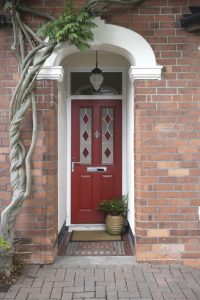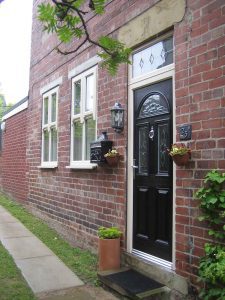In the world of home improvement, it’s a question almost as old as time: What’s the difference between a composite door and a uPVC door? You’ve probably heard the terms “uPVC” and “composite” a lot when researching the best front entrance solution for your home, but we wouldn’t blame you for not knowing what makes each unique. Well, wonder no more, because we at Unique Glazing are here to put an end to the composite door vs uPVC door debate for good.
From thermal insulation properties to the level of security both door types offer, there are a lot of differences between composite doors and uPVC doors that homeowners across the London boroughs should consider. If you have a specific question about this topic, odds are it’s answered below. But remember you can also contact us for a free quote at any time. Here’s everything you need to know about how composite and uPVC doors differ.
What is a composite door?

Composite doors are easily identifiable by the inherent vintage aesthetic they boast which replicates the classic look of timber. These panels are named “composite”, however, because while they look traditional, the inside is made of a multi-layered composition of materials that enhances security, weatherproofing, and energy efficiency. All these factors working in tandem help make composite doors fitted by Unique Glazing a perfectly suited door for the modern homeowner.
Despite being engineered to be tough, composite doors are extremely versatile in terms of design too. Styles range from true timber effect all the way to contemporary colours, meaning that they can be fitted to suit almost every age of the home. Combine said attractive qualities with A++ rated energy performance that helps ensure your property refuses to let heat escape, and composite doors represent both form and function rolled into one.
Key composite door features
- A++ Energy efficiency rating
- Hallmark GRP (Glass Reinforced Plastic) coating
- Secured by Design and PAS 24 accredited
- Multipoint locking
- Various colours and decorative glazing styles
What is a uPVC door?

In layman’s terms “uPVC” stands for unplasticized polyvinyl chloride, and is by far the most popular choice of door material used in the UK due to its inherent cost-effectiveness. Throughout the 70s and 80s improvements installed in uPVC were considered cheap and unsightly, but that’s no longer the case thanks to countless modern improvements. uPVC doors are now a worthy alternative to composite door solutions.
As well as being low maintenance and comparatively affordable, for instance, lead-free uPVC doors fitted by Unique Glazing come A++ rated to keep the home warm all year round. This is because of each panel’s multi-chambered construction, which traps the heat in your living space and prevents it from escaping. This enables uPVC doors to reduce your energy bills in the long term, too, as you’ll be turning on your central heating less. All these benefits sit alongside increased kerb appeal, thanks to the wide range of colours and stylish panel options possible.
Key uPVC door features
- A++ Energy efficiency rating
- Low maintenance
- Secured by Design and PAS 24 accredited
- Cost-effective
- Various colours and decorative glazing styles
Which door material is the best one for my London home?
So how do composite doors and uPVC doors stack up with one another? Both share a lot of similarities when it comes to security benefits, energy efficiency, and flexible style, so to help you better get a specific idea of the differences, we’ve broken them down below:
| uPVC Doors | Composite doors | |
| Energy efficiency | A++ Rated | A++ Rated |
| Security | Secured By Design, PAS 24 | Secured By Design, PAS 24 |
| Glazing | Double or triple | Double or triple |
| Life expectancy | 20+ years | 30 years |
| Core makeup | 4- to 6-chambered profile | GRP, High-density foam |
| Customisation | Panel colours, decorative glazing | Panel colours, decorative glazing |
Quality front entrance solutions from Unique Glazing you can trust
As is hopefully evident from the information outlined above, both composite doors and uPVC doors tout benefits useful to the modern homeowner. If you’re still not sure about which door style would be the perfect choice for your household, why not contact a member of our team today for a free quote using our online form? We’d be happy to discuss the details with you further.








